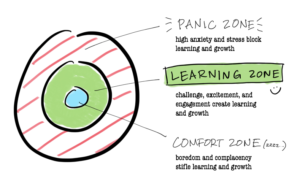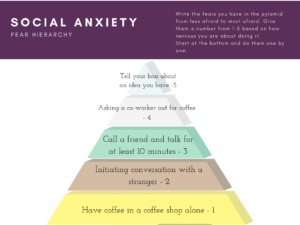For a moment, I thought I lost the ability to speak.
Words swirled in my mind… but nothing came out of my mouth.
I was that anxious.
It was as if I wore an invisible pair of legcuffs and handcuffs… fumbling through conversations and not expressing myself in the way I want.
After going to therapy and more importantly talking with strangers over the last few years, I am now able to talk even when I feel nervous.
In this article, I will share a few strategies that have worked best.
Accept your anxiety
Anxiety can be an incredibly difficult emotion. Suppressing it or ignoring it doesn’t really work, and it may very well backfire. As Dr. Lane Pederson wrote in his book:
“Even when emotions seem to overtake life, such as when we are depressed or anxious or angry, it is important to remember that those emotions still give us important information. Rather than judging our emotions, practice acceptance of them and open your mind to their messages. Rejecting emotions or trying to push them away usually intensifies them. If the message is not heard, it needs to get louder. As an example, invalidation by others tends to intensify emotions, and self-invalidation has the same effect.”
Here’s what you could do instead:
- Accept your anxiety. This isn’t about grudging acceptance; this is about being kind to yourself. Tell yourself that “It’s OK that I’m feeling this way”, and gently bring your attention back to the conversation.
- Focus back on the conversation. Ask yourself, “How can I connect with him/her despite my difficult feelings?”
In other words, accepting how you feel — and talking despite the emotion — is key in having a healthier relationship with your feelings.
(This approach is based on Acceptance and Commitment Therapy, which I’m a strong advocate for)
Understand why you’re anxious
Is the topic making you anxious?
If it’s a topic that brings up unpleasant memories: For example, bullying or anything traumatic. Share how you feel and set boundaries without blaming the other person.
You could say something like:
- “I know that it isn’t your intent, but I feel anxious talking about <topic> because <reason>. Could we change topics?” or
- “Sorry, but I feel uncomfortable talking about <topic>, because <reason>. Could we talk about it when I’m more ready?”
If it’s a difficult but important topic you can’t avoid: For example, a relational conflict, or a potential job promotion. Acknowledge how you feel and do your best to connect with the other person, while protecting your needs when necessary.
There’s no specific wording that I’d recommend, but the general principles are a) acknowledge your needs b) acknowledge the other person’s needs too. It’s about being able to see from your point of view and their point of view.
Here’s a question I learned from Vienna Pharaon, a top relationship therapist:
“How can I protect (my needs) while connecting (with your needs)?”
Is the person making you anxious?
If so, here are a few relevant articles:
- How to keep a conversation going with an extrovert
- How to keep the conversation going with someone who isn’t listening
- How to keep the conversation going with people more successful than you
- How to keep the conversation going with someone older or more experienced
- How to keep a conversation going when you have nothing in common
Is the environment making you anxious?
- If you’re uncomfortable talking in private, suggest that you move to a public space instead. You could say something like:
“I’d prefer that we talk in an open environment. Would you be OK with that?” - If you’re uncomfortable talking in a noisy environment, check out this other article: How to keep a conversation going when it’s too noisy
Reframe your anxiety as “anxietment”
When I was discussing with my therapist, Sean Swaby, about my anxiety, he suggested that I not only accept my emotions, he also shared how anxiety can be a good thing.
If I feel excited but scared about something, it’s a signal that it’s important or valuable. Hence the word “anxietment”: anxiety + excitement.
Think about it: why would you feel anxious if you didn’t care about connecting with the other person?
Understand the spotlight effect
We all are susceptible to the spotlight effect, where we overestimate how much others pay attention to us. Why do we do it? Nathan A Heflick, a psychology lecturer, wrote:
“We all are the center of our own universes. This is not to say we are arrogant or value ourselves more than others. Rather, our entire existence is from our own experiences and perspective. And we use those experiences to evaluate the world around us, including other people.”
Most people are so immersed in their universes that they won’t notice your anxiety as much as you do. Even if they do notice it, they won’t make a big deal of it. Some might even be supportive and try making you feel better.
Give others the spotlight
You can get out of the “spotlight” by talking less and listening more.
In fact, to have a meaningful conversation, you don’t need to know what to say — you just need to know how to listen and respond.
Try these tips when you don’t know what to say
- Give the other person space to jump im
- Acknowledge their response
- Ask for their suggestions on what to talk about
- Admit that you don’t know what to say
I wrote more about these tips here:
How to keep a conversation going when you don’t know what to say
This might help too: 25 useful phrases to keep a conversation going (and avoid awkward silence)
Map out your anxiety hierarchy
While you want to get out of your comfort zone and practice your social skills, you also don’t want to push yourself too much and get overwhelmed. You want to be in the sweet spot, where you’re feeling nervous but not too anxious that you can’t even utter a world.

So how do you figure out your sweet spot in social situations?
Start by creating a social anxiety hierarchy (this is sometimes known as a fear ladder). Arnic Curnic, a clinical psychologist, explains:
“Social anxiety hierarchies are an ordered list of situations that trigger anxiety from least to most anxiety-inducing triggers… By breaking the situation down into steps, you can see exactly what portions of social settings make you nervous. The different stages give you a process of confronting your fears in a gradual and safe manner.”
For example, if having a one-on-one conversation with a stranger is too scary, try talking to the friendly barista instead.
Here’s how to create your anxiety hierarchy or fear ladder:
- Write down a list of 5+ social situations that make you anxious
- Rank them on a scale of 1 to 5 (or 1 to 10).
Here’s a completed example:

Take it one conversation at a time
When you feel anxious, it’s easy to think that “gah, I just want this to go away now”.
It takes time and practice to be at ease with your anxiety, and to communicate despite the difficult emotions.
Let me know which of these tips resonate with you, and if you feel I missed anything! I’m one email away – ianchew.x at gmail.com.

